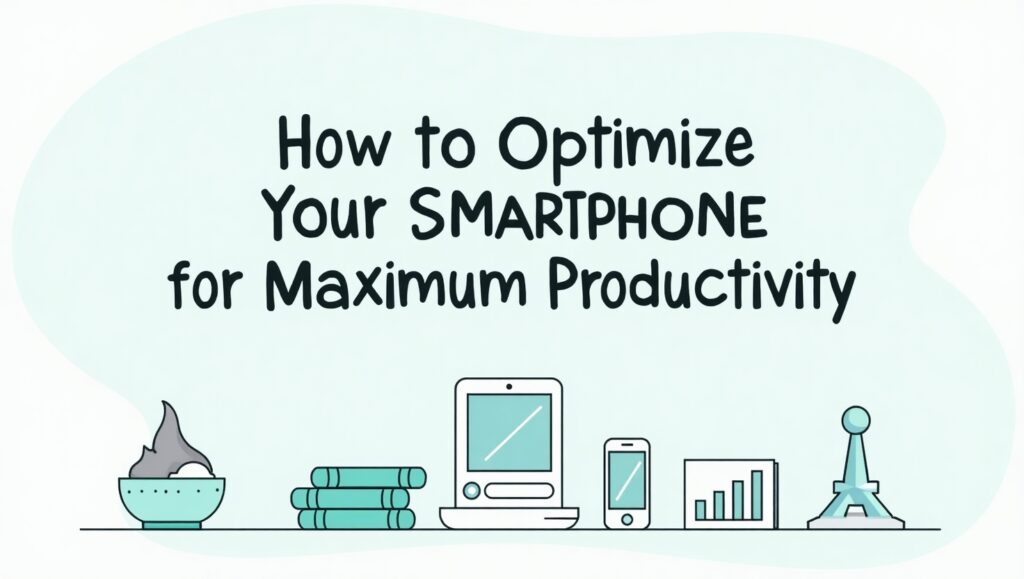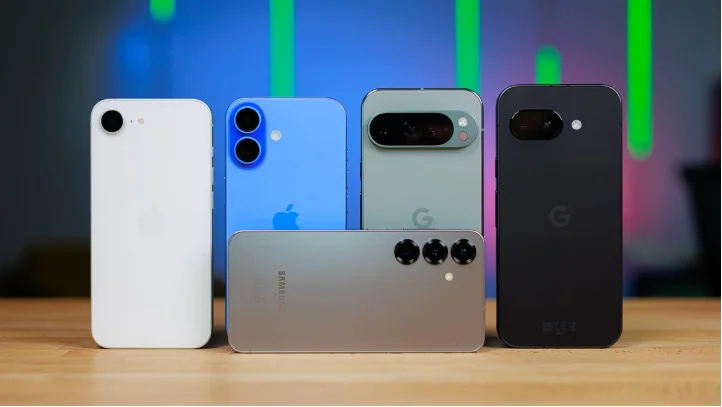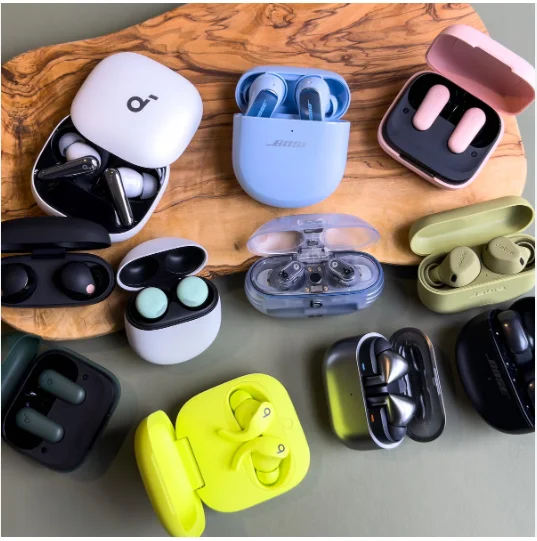
Introduction
In today’s fast-paced world, smartphones have become more than just communication tools; they are essential productivity devices. Whether you’re managing emails, attending meetings, or organizing tasks, your smartphone plays a significant role in boosting your efficiency. However, to make the most out of your device, optimizing it for performance is crucial. In this article, we’ll explore Optimize Your Smartphone for Maximum Productivity for maximum productivity, along with tips on streamlining its performance and ensuring smooth usage throughout the day.
Overview
Smartphones are powerful tools, but as they accumulate apps, data, and background processes over time, their performance may slow down. If you’re wondering Optimize Your Smartphone for Maximum Productivity or how to speed up your phone in general, it’s essential to take a strategic approach. By freeing up resources, optimizing settings, and removing unnecessary clutter, you can enhance your phone’s speed and improve its functionality, allowing you to stay productive on the go. Whether you’re looking to speed up your phone’s internet or improve overall efficiency, this guide will provide you with the necessary steps to optimize your device.
How to Speed Up Your Phone for Maximum Productivity
Optimizing your smartphone is about more than just making it faster. It’s about improving its overall performance to help you work more efficiently. Here’s how you can do it:
1. Clear Cached Data Regularly
Over time, your phone stores cached data, which can slow down its performance. Cached data, while helping apps load faster, can also accumulate and take up valuable storage space. To speed up your Android phone, regularly clear the cache for apps and system files.
- How to do it: Go to Settings > Storage > Cached Data and clear it. For individual apps, navigate to Settings > Apps > [App Name] > Storage and tap Clear Cache.
Why it works: Clearing cached data helps free up space and ensures your phone operates more smoothly by preventing unnecessary storage from slowing things down.
2. Disable or Uninstall Unnecessary Apps
Unused apps can consume a significant portion of your phone’s storage, leading to slower performance. If you’re trying to speed up your Android phone in 10 seconds, this quick fix involves either disabling or uninstalling apps you don’t need.
- How to do it: Go to Settings > Apps, find apps you don’t use, and either uninstall or disable them. Disabling apps stops them from running in the background.
Why it works: By removing apps that aren’t necessary, you free up storage space, and your phone won’t have to waste resources on background processes from these apps.
3. Turn Off Animations and Transitions
While smartphone animations add visual appeal, they can drain processing power and slow down your device. Disabling or reducing these animations can significantly speed up your phone, especially if you’re looking to improve its responsiveness.
- How to do it: To turn off animations, enable Developer Options by going to Settings > About Phone > Tap Build Number 7 times. Then, go to Developer Options in the Settings menu, and adjust or turn off Window Transition Scale, Animator Duration Scale, and Transition Animation Scale.
Why it works: Turning off animations reduces the load on your device, making it faster and more responsive.
4. Update Your Phone’s Software
Software updates often include bug fixes and performance improvements that can help optimize your phone. Keeping your device’s operating system up-to-date ensures that it runs smoothly and efficiently.
- How to do it: Go to Settings > Software Update and check if there’s an available update. If there is, download and install it.
Why it works: Updates fix bugs, patch security vulnerabilities, and can often improve system performance, helping you speed up your Android phone over time.
5. Limit Background Processes and Notifications
Many apps run processes in the background, consuming both storage and processing power. Similarly, constant notifications can interrupt your workflow and cause your phone to lag.
- How to do it: Limit background processes by going to Settings > Battery and adjusting which apps can run in the background. You can also turn off unnecessary notifications under Settings > Notifications.
Why it works: Reducing background processes and notifications frees up your phone’s resources, enabling it to run faster and improve productivity.
6. Use Lighter Versions of Apps
Many popular apps, such as Facebook, Messenger, and Instagram, have “lite” versions that consume fewer resources and use less storage space. Switching to these lighter versions can help speed up your phone’s internet and improve overall performance.
- How to do it: Search for the “lite” version of any app in your phone’s app store and install it.
Why it works: Lighter apps have fewer features and less clutter, so they run faster and consume less data, improving your phone’s overall speed.
7. Optimize Your Storage
When your phone’s storage is almost full, it can significantly slow down its performance. Optimizing your storage by moving files to the cloud or deleting old files can help free up space and make your phone faster.
- How to do it: Move photos, videos, and documents to cloud storage like Google Drive or Dropbox. Regularly delete old messages, photos, and other files you no longer need.
Why it works: By freeing up space, your phone can operate more efficiently, resulting in faster app load times and improved responsiveness.
8. Speed Up Your Phone’s Internet
A slow internet connection can be frustrating and affect your productivity. To improve your internet speed, try switching between Wi-Fi and mobile data to find the faster option. Additionally, clearing your browser cache and disabling background apps that consume data can help boost internet performance.
- How to do it: Go to Settings > Wi-Fi and connect to a faster network. Or, use a mobile hotspot for a quicker connection if available.
Why it works: A faster internet connection ensures that apps and websites load more quickly, improving your efficiency and reducing delays.
Benefits of Optimizing Your Smartphone
Optimize Your Smartphone for Maximum Productivity isn’t just about speed; it has several other advantages that can help you stay efficient throughout the day. Here are some key benefits:
- Improved Performance: A well-optimized phone runs faster, making tasks such as email management, scheduling, and browsing smoother.
- Increased Battery Life: By turning off unnecessary background processes and limiting app usage, you reduce battery drain and extend your phone’s battery life.
- Enhanced Focus: Fewer distractions, like unwanted notifications, help you focus better on tasks and be more productive.
- Longer Device Lifespan: Regular optimization can prevent your phone from slowing down over time, which helps it last longer.
FAQ Section
1. How do you speed up your Android phone?
To speed up your Android phone, try clearing cached data, uninstalling or disabling unnecessary apps, turning off animations, and updating your phone’s software. These simple steps can significantly improve performance.
2. How to speed up your phone’s internet?
To speed up your phone’s internet, try switching between Wi-Fi and mobile data, clearing your browser cache, and closing background apps that use your network. This should help ensure the best internet speed.
3. How to speed up your Android phone in 10 seconds?
To speed up your Android phone in 10 seconds, clear your browser history, close any apps running in the background, and turn off unnecessary notifications.
4. Why is my phone so slow, and how can I fix it?
Your phone might be slow due to a cluttered cache, too many apps running in the background, or outdated software. Try clearing the cache, uninstalling unused apps, and updating your software to improve its performance.
5. How do I speed up my phone’s performance for better productivity?
To boost your phone’s productivity, optimize storage, minimize background processes, and turn off unnecessary notifications. These steps will help your phone run faster and allow you to focus on your tasks.
Final Thoughts
Optimizing your smartphone for maximum productivity is a game-changer. By following these simple steps, you can Optimize Your Smartphone for Maximum Productivity, improve its internet performance, and keep it running efficiently for everyday tasks. With a faster and more responsive device, you’ll be able to tackle your to-do list with greater ease, ultimately boosting your overall productivity. Whether you want to speed up your Android phone or optimize its functionality for better work performance, these tips are designed to help you get the most out of your smartphone.



